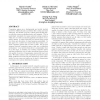Free Online Productivity Tools
i2Speak
i2Symbol
i2OCR
iTex2Img
iWeb2Print
iWeb2Shot
i2Type
iPdf2Split
iPdf2Merge
i2Bopomofo
i2Arabic
i2Style
i2Image
i2PDF
iLatex2Rtf
Sci2ools
134
click to vote
WINE
2009
Springer
2009
Springer
Competitive Routing over Time
Congestion games are a fundamental and widely studied model for selfish allocation problems like routing and load balancing. An intrinsic property of these games is that players allocate resources simultaneously and instantly. This is particularly unrealistic for many network routing scenarios, which are one of the prominent application scenarios of congestion games. In many networks load travels along routes over time and allocation of edges happens sequentially. In this paper we consider two frameworks that enhance network congestion games with a notion of time. We propose temporal network congestion games that use coordination mechanisms – local policies that allow to sequentialize traffic on the edges. In addition, we consider congestion games with time-dependent costs, in which travelling times are fixed but quality of service of transmission varies with load over time. We study existence and complexity properties of pure Nash equilibria and best-response strategies in both ...
Related Content
| Added | 25 May 2010 |
| Updated | 25 May 2010 |
| Type | Conference |
| Year | 2009 |
| Where | WINE |
| Authors | Martin Hoefer, Vahab S. Mirrokni, Heiko Röglin, Shang-Hua Teng |
Comments (0)

